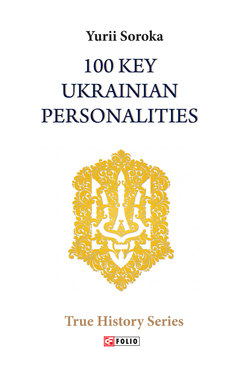Читать книгу 100 Key Ukrainian Personalities - Юрий Сорока - Страница 8
На сайте Литреса книга снята с продажи.
Volodymyr the Great (960 (963) – 1015)
ОглавлениеPrince Volodymyr, known to our contemporaries as Baptizer of Kyivan Rus’, was a son of Sviatoslav Ihorovych by a woman whom the chronicles named as a slave housekeeper at Princess Olha’s court. Her name was Malka, or Malusha. As O. Shakhmatov, a Russian scholar of the late XIX century, believes, Malka was a daughter of Drevlian Prince Mal, the organizer of Ihor’s murder. However, there is no proof of Shakhmatov’s version, while The Tale of Bygone Years reports that “Malka’s father was Malko from Lubech”.
Volodymyr the Great. A portrait from the Title reference book, XVII century
When still little, Volodymyr was appointed the governor of Novgorod. Dobrynia, who evidently, was Malka’s brother, was appointed Regent for the minor Prince. In 977 there began a fight among Sviatoslav’s sons for the power in Kyivan Rus. It was then that Yaropolk, the oldest brother killed Oleh, the younger brother, and after that, Volodymyr hired some Norman warriors and went to Kyiv. In that feud, Yaropolk was killed and Volodymyr came to the prince’s throne in Kyiv. As Nestor Chornoryasnyk informs in his chronicle, it happened in 980-
“…And Volodymyr began to reign in Kyiv alone. And he put some idols on the hill behind the yard of his palace: a wooden statue of Perun with a silver head and golden moustache. And Hors, and Dazhboh, and Stryboh, and Simargl, and Mokosh…”
Prince Volodymyr began his state activities by making Southern Slav tribes join Kyiv. Those tribes had not been a part of Kyivan Rus’ or had left it after Yaropolk’s death. In 981, Volodymyr organized his first military campaign against the Croatians and the Dulebes. Then the uprisings of the Viatiches and Radymyches were suppressed. With that, the building of Rus’ was mainly completed. Thus, Prince Volodymyr could focus on state reforms. By Volodymyr’s order, all tribe chieftains were substituted by governors from the prince’s closest circle. Some new laws were adopted, the Law on Land is considered the main one among them. Volodymyr paid special attention to defending the borders of Kyivan Rus’ from the attacks of the tribes of Yatviags and Volga Bulgars.
Traditionally, the relations with the Byzantine Empire played a vital role in Volodymyr Sviatoslavych’s foreign policy. Being supported by Volodymyr’s warriors, Emperor Basil suppressed the feudal lords’ rebellion. In return, Volodymyr wanted the Emperor to let him marry Princess Anna. In reply, the Byzantines put forward a demand that Volodymyr should be baptized. The chronicle writes that the negotiations about the change of the state religion in Rus’ lasted for a long time but in 988, after Korsun campaign and the Byzantines’ suggestion, the prince made up his mind about baptizing by the Orthodox Christianity.
“…Then Volodymyr sent his messengers throughout the city, saying, “If anybody does not appear near the river tomorrow – a rich man or a poor one, or an old man, or a slave, – he will be my enemy…” And the next day Volodymyr went to the Dnieper with the priests from Tsargorod and from Korsun. And huge crowd gathered and went into the water… and the priests, standing, prayed. And a great joy was seen both in Heaven and on the earth that so many souls were saved…”
Volodymyr Sviatoslavych died on July 15, 1015 while preparing for the campaign against Novgorod and Yaroslav, a son of his. He was buried in the Church of the Tithes built by him in Kyiv.
Prince Volodymyr’s Baptizing. Fresco by V. Vasnetsov in the Kyiv Volodymyr Cathedral
